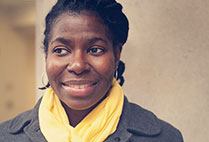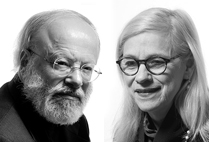Scientists pride themselves on the diamond-hard discipline of the objective observer, yet a recent study suggests that despite years of training, some of the most highly regarded researchers in the country can’t escape a deep-seated belief that natural phenomena exist for a purpose.
Deborah Kelemen, a College of Arts & Sciences associate professor of psychology, and coauthors Joshua Rottman (GRS’14) and Rebecca Seston, a CAS psychology lab manager, asked 80 scientists at research universities such as Harvard, Yale, and MIT to judge the truthfulness of statements about why natural events and objects occur. Two groups of scientists, one working under time pressure and one with no time restriction, were asked about the accuracy of assertions such as, “Trees produce oxygen so that animals can breathe” and “The Earth has an ozone layer to protect it from UV light.”
Two control groups, one made up of undergraduates and one of people with bachelor’s degrees and the same age as the scientists, were given the same test. The test consisted of 100 one-sentence explanations for “why things happen”; 30 of them were test sentences and 70 were control sentences, describing relationships, such as, “Conception occurs because sperm and eggs fuse together” or “Children wear mittens in the winter to keep their hands warm.” Using a laptop computer, some participants were given a response time of 3.2 seconds, and others had no time restriction.
The researchers discovered, unsurprisingly, that the trained veteran scientists were less likely than the control groups to find reasons in relationships where there were none. But they also found that under pressure from the clock, the scientists became increasingly likely to say that natural relationships exist to serve a purpose.
“It was quite surprising,” says Kelemen, the lead author of the study, which was published in the October 2012 issue of the Journal of Experimental Psychology. “Even though advanced scientific training can reduce acceptance of scientifically inaccurate teleological explanations, it cannot erase a tenacious early-emerging human tendency to find purpose in nature. It seems that our minds may be naturally more geared to religion than science.”
Kelemen, whose research was funded by the Cognition, Religion and Theology Project at Oxford University and the National Science Foundation, learned in earlier research that our “strong gut orientation to view natural objects and events as occurring for a purpose” emerges early in development and becomes so entrenched that years of specialist education and expertise can’t erase it. That is not to say, she asserts, that the tendency is innate or hardwired.
“We are not born with those ideas intact,” she says. “Humans do have strong predispositions to construct beliefs about purpose and function in nature, but it’s physical, social, and cultural environments that bring them out.”
What those environments are exactly, and how potent they are, is the focus of Kelemen’s current studies.
The research is helpful, Kelemen says, because “it tells us what we are up against when tackling the complexities of science education and how careful our language needs to be when trying to offer scientific explanations or foster scientific thought….It also sends out an alert to members of the scientific community. It’s telling scientists that they are not as scientifically objective as they may think. Unconscious biases with deep developmental roots are affecting such things as our communications.
“On the positive side,” she says, “it shows that those biases can be curbed if we compensate for them by thinking twice. But thinking twice is key.”














































Related Stories
New Book by BU Researchers Teaches Natural Selection to Children
Presents complex concepts in storybook form
Can Young Children Understand Complex Science?
Study by BU researchers: more than previously believed
You Are What You Feel
Hardwired belief in immortality shared by different cultures
Post Your Comment